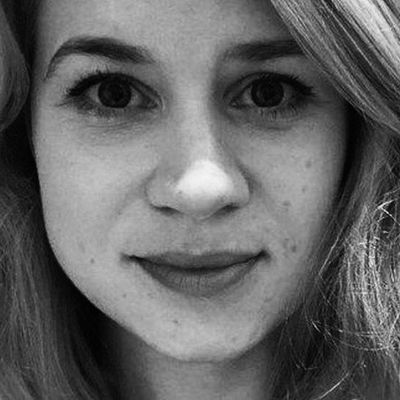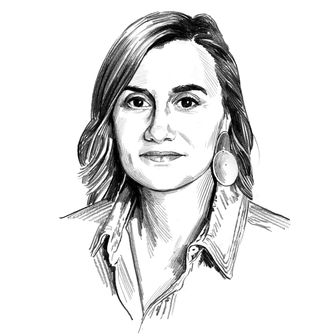
The horrific details of Sarah Everard’s death have triggered outrage, particularly among women who see slivers of their own experiences in her story. On the night of March 3, the 33-year-old disappeared in South London after walking home from her friend’s house. She was wearing a bright-green raincoat, walking in a well-lit area, and speaking to her boyfriend on the phone. Almost a week later, police arrested a Metropolitan officer as the murder suspect, and today they identified Everard’s body in the woods of a neighboring county.
The tragedy has reminded many women of the constant threat they feel in public and the vigilance required to stay safe, whether by clutching keys between their fingers, throwing rape whistles in their purses, or using location-tracking apps. Over the past week, they’ve been posting stories of harassment and assault alongside hashtags like #ReclaimTheNight or #Shewaswalkinghome. Many are exhausted and angered by the burden of self-protection. But more nuanced discussions have also emerged from the united front, about how white women’s deaths are emphasized and whether fear is a logical response to random acts of violence. The Cut spoke with six women about how they reacted to the news of Sarah Everard’s death.
“I walk the same route she was on.” —Kitty O’Connor, 24, London, Acting Student
I live right in the area where Sarah was walking. It’s super busy and not derelict at all. I walk the same route she was on from Clapham to Brixton, and police searched the pond that I pass. Mid-last week, loads of posters went up. At first I thought, I’m sure it will be fine, and brushed it off. But as time went on, we all knew she wasn’t missing any more. I got to the point where I didn’t even want to go outside without my boyfriend. Last night, I finished a rehearsal for a play at 9:30 p.m. and was frightened to walk for five minutes to the station on my own. I felt hyperaware and was on the tube with these three men who were saying disgusting things about women. It’s hard to feel scared during lockdown because walking is one of the few luxuries we have right now.
Rationally it’s like, Okay, they’ve probably got the guy who did this. But I think that walk will always be tinged with a huge sense of sadness that it could have been me or one of my friends. It was just a luck thing. Sarah was following all these bullshit rules that society tells us women need to follow to be safe. And it still wasn’t enough.
“Had Sarah been a Black woman, there would not have been this rage.”—Mariam Khan, 28, London, Gender Studies Student
I only recently moved to London from Birmingham, and hearing about Sarah’s death has really, really shaken me. I haven’t left the house today. I usually do walks early in the morning, and I was like, It’ll be too quiet and there won’t be people around. I was thinking of getting one of those rape alarms. As a visibly Muslim woman, I’m always kind of aware of being perceived in a hostile way. People see my scarf and they’ve already made up their minds about me.
I feel scared around the police, especially when I see them in airports carrying guns. To know that the suspect is an officer, and that there are now going to be more in the area is just really awful. A lot of kids are taught that if you’re in danger, call the police. I don’t think that is how a lot of women feel.
I just kind of spiraled today because this is a white woman who seems like she ticked all the boxes: She was walking on a main road, she was wearing brightly-colored clothes, she was fully covered, she was on the phone. What about the women who aren’t palatable enough for the mainstream news to cover? I saw another tweet about this Black girl, Blessing Olusegun, who was walking on the beach last summer and someone found her body, but the case is still unsolved. I think that had Sarah been a Black woman, there would not have been this rage. People may think I’m using Sarah’s death to politicize something, but at the end of the day, all I want is for women to not be killed at the hands of men. Yet not every woman has the privilege of making it to the news headlines.
“That could have been me.”—Shannon Stirone, 36, San Francisco, Freelance Journalist
Seeing the news broke my heart. That could have been me. That could have been any woman. The first thing that came to mind was when I was studying abroad in Florence and was crossing a bridge on my way home from a bar. It was 2004 and there were two large men behind me speaking German who started to get closer and closer. I started walking faster, and they ran and grabbed me. I think they were probably going to rape me. I freaked out just enough where I was able to elbow them both in the stomach, knock one of them in the face, and get them off of me just long enough to bolt. It was just complete survival mode.
There have been countless times where I hear footsteps behind me and every part of my brain and body goes into fight-or-flight. Even just a few months ago, I was walking home from the grocery store and this man started following me. I ran into a well-lit CVS and texted my friend before bolting home.
I remember the day my parents taught me to hold a key between my knuckles when I was around 11. My dad said, “If anyone comes near you, here’s how you punch. This is an uppercut.” I still hold a key instinctually, even if I’m walking just ten feet away from my car to my front door. It is so instilled in us from such a young age that “you are always in danger” for no other reason than the fact that you are a female.
“I didn’t react with fear.”—Simone Webb, 27, London, Freelance Editor
Sarah’s case is awful and tragic, but I didn’t react with fear. I don’t want to downplay the fears other women have about their safety or imply that it’s silly. But what’s bothering me in the discourse around her death is the way that some people seem to universalize the feeling of terror women have being out on the street at night. It’s not something that I experience — I might feel slightly cautious, but I want to push back slightly on this inevitability of fear. While women do get attacked by strangers, it’s relatively uncommon. Women experience more risk in domestic settings than in the streets. So if this hypervigilance is warranted anywhere, it should be in the home. I think this fear women are taught at a young age comes at a great cost to personal freedom.
I think the conversation needs to focus on the suspected policeman and how this crime was potentially committed by someone who was part of state law enforcement. For all we know, Sarah may have been approached by someone she has been raised to trust as a white person. This was a woman who “did everything right” and still died. That shows these supposed safety measures inculcate a false sense of security. The truth is these events are a lot more random and uncontrollable, which I think is part of where the fear comes from.
“Our pain is not taken seriously, especially in a police force rife with misogyny and racism.”—Sophia Moreau, 26, London, Deputy CEO, Nonprofit Organization
This case is the materialization of all our fears. And the fact the prime suspect is a police officer kind of underscores the misogyny embedded in the institutions that are supposed to protect us. When I was 16, I was stalked by an older man. He was short with dark hair, green eyes, and pale skin. A few weeks later, I had moved to a different address, and I saw him outside again. I reported it to my school’s community police officer, who sat slouched in his chair trying to poke holes in my story. He said basically, “It’s just another story of the girl getting chatted up. And if we took on every one of these cases, we’d be snowed under.” It left me feeling like what happened to me was just seen as acceptable. Whenever someone says “go to the police,” I feel like they haven’t actually thought about what happens to women when you do.
Black women have known for a very long time that our pain and the violence against us will not be taken seriously, especially in a police force rife with misogyny and racism. Last year, two sisters who were women of color were murdered in a park in a very gruesome way. Police officers took selfies with their dead bodies and sent it around in a WhatsApp group. There wasn’t a sense of urgency in terms of getting to the bottom of their case.
What happened to Sarah could happen to any woman. But as Black women, we know there probably wouldn’t be a thorough investigation, let alone coverage. The public sympathy just wouldn’t really be there.
“I’ve become desensitized to these awful things happening to women.”—Tiana McKay, 18, Yorkshire, Student
Sarah’s death was obviously horrible to hear about. At the same time, I’ve become desensitized to these awful things happening to women. I was raised to fear men. When I was 8, my mom told me, “If you get lost, make sure you ask a woman for help.” When I was 16, she gave me a rape alarm before I went to a music festival.
I try not to walk alone. If I’m out, I never go to the bathroom by myself. I lock the door even if I’m just waiting in the car park at a supermarket. It’s natural behavior that I don’t think about on a deeper level. I went out for my 18th birthday and there were some men at the train station. One of them said to my friends, who were wearing skirts and dresses, “Why have you got your legs out tonight?” As much as I wanted to say something to them, it’s safer to bite my tongue. When I was in high school wearing my school uniform, older men would come up and try and talk to me. I was 13!
It’s really frustrating because I do want to see the change. But I think women are doing all they can and I don’t think it should fall on us to adapt how we are behaving. That should be on men. I’ve got two younger brothers, actually, and I’ve become more interested in making sure that they’re feminists like me.


